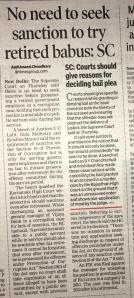A public servant is a person who works for government of a state or a country. If anybody initiate prosecution against a public servant for offence of corruption then sanction is must to be taken first from the department’s competent officer.

But as per Supreme Court’s bench of justices U U Lalit, Indu Malhotra and Krishna Marar on Thursday said that requirement of sanction U/S -19 of Prevention of Corruption Act is only for serving government employees not after retirement.
Against a retired Public Servant prosecution can be initiate for the offence committed during his/her service period.
F.I.R was lodged against the manager for misusing his position in granting loan of Rs 3 crore to a company in 2010. And case was filed after public servant’s retirement in 2012.
In this case Supreme Court quashed the verdict of Karnataka High Court, in which H.C held that protection should continue even after retirement and discharged the assistant general manager of Vijaya Bank in Corruption case for lack of sanction.
H.C had also held that protection is available after retirement because he is prosecuted for offences under sec-19(1) of Prevention of Corruption Act.
The Supreme Court’s bench said that H.C erred in its decision and also held that “there was no occasion to entertain any application seeking discharge in respect of offences punishable under the Act, on the ground of absence of any sanction under Section 19 of Prevention of Corruption Act.
For more legal updates stay connected with us.
For more info dial – 7888356908.